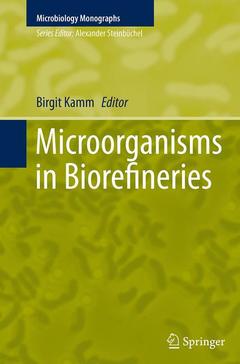Description
Microorganisms in Biorefineries, Softcover reprint of the original 1st ed. 2015
Microbiology Monographs Series, Vol. 26
Coordinator: Kamm Birgit
Language: English
Subjects for Microorganisms in Biorefineries:
Publication date: 08-2016
Support: Print on demand
Publication date: 12-2014
369 p. · 15.5x23.5 cm · Hardback
Description
/li>Contents
/li>Comment
/li>
The book describes how plant biomass can be used as renewable feedstock for producing and further processing various products. Particular attention is given to microbial processes both for the digestion of biomass and the synthesis of platform chemicals, biofuels and secondary products.
Topics covered include: new metabolic pathways of microbes living on green plants and in silage; using lignocellulosic hydrolysates for the production of polyhydroxyalkanoates; fungi such as Penicillium as host for the production of heterologous proteins and enzymes; bioconversion of sugar hydrolysates into lipids; production of succinic acid, lactones, lactic acid and organic lactates using different bacteria species; cellulose hydrolyzing bacteria in the production of biogas from plant biomass; and isoprenoid compounds in engineered microbes.
Penicillium canescens host as the platform for development of a new recombinant strains producers of carbohydrases.- Microbial life on green biomass and their use for production of platform chemicals.- Microorganism for bioconversion of sugar hydrolysates into lipids.- Lignocellulosic hydrolysates for the production of polyhydroxyalkanoates.- Microbial research in high-value biofuels.- Microorganisms for biorefining of green biomass.- Microbial succinic acid production using different bacteria species.- Whole cell biocatalytic production of 2,5-furandicarboxylic acid.- Microorganisms for production of lactic acid and organic lactates.- Microbial Lactone Synthesis Based on Renewable Resources.- Production of industrially-relevant isoprenoid compounds in engineered microbes.- The role of cellulose hydrolyzing bacteria in the production of biogas from plant biomass.
Enriches understanding of the recent developments in microbial biotechnology
Outlines both laboratory approaches and large scale applications
Explains how exploiting biomass can replace fossil raw materials
Includes supplementary material: sn.pub/extras




